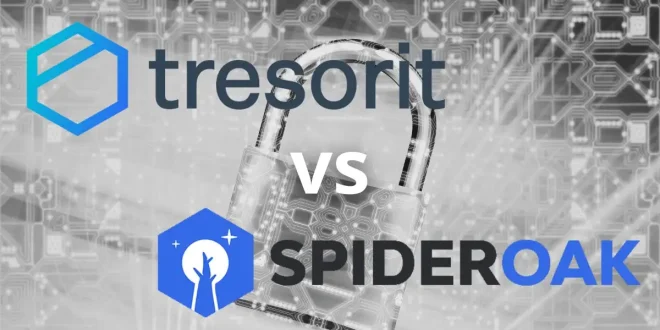In an era where data breaches make headlines and privacy concerns dominate tech discussions, the quest for secure cloud storage has never been more critical. Enter Tresorit and SpiderOak, two titans in the realm of encrypted cloud solutions. But which one reigns supreme in the battle for your digital fortress? Let’s dive into this high-stakes showdown and uncover the strengths and quirks of these security-focused services.
The Swiss Vault vs. The American Fortress
Imagine your data as a prized collection of rare artifacts. Where would you store them? In a Swiss bank vault or an American military bunker? That’s essentially the choice you’re making between Tresorit and SpiderOak.
Tresorit, the Swiss contender, brings to the table its reputation for neutrality and stringent privacy laws. Founded in 2011, this European upstart has quickly climbed the ranks, now sitting pretty at #19 in the cloud storage market with a 2.0% mindshare. It’s like the new kid on the block who showed up with a state-of-the-art security system and charmed everyone with their user-friendly smile.
SpiderOak, on the other hand, is the grizzled veteran from across the pond. Born in 2006, this American company has been in the game longer, evolving from a simple backup solution to a space-age cybersecurity powerhouse. It’s currently ranked #20 in the market with a 1.6% mindshare, like the seasoned pro who’s seen it all and decided to take their game to the final frontier – literally.
Security Showdown: End-to-End Encryption vs. Zero-Knowledge Privacy
When it comes to keeping your data under lock and key, both Tresorit and SpiderOak bring out the big guns. Tresorit employs end-to-end encryption using AES-256, the same standard used by the military. It’s like wrapping your files in an impenetrable force field before they even leave your device.
SpiderOak counters with its “No Knowledge” encryption. Imagine a vault where even the guards don’t know what’s inside. That’s SpiderOak’s approach – they can’t access your data even if they wanted to.
But here’s where it gets interesting. Tresorit has undergone independent security assessments by Ernst & Young, essentially inviting the world’s top security experts to try and crack their code. SpiderOak, not to be outdone, recently launched its core technology as an open-source project named ‘Aranya’ in October 2024. It’s like they’re saying, “Here’s our secret recipe. Try to make it better!”
User Experience: Swiss Precision vs. American Pragmatism
Here’s where the battle gets heated. Tresorit, true to its Swiss roots, offers a sleek, intuitive interface that’s as smooth as a well-oiled watch movement. Users rave about its ease of use, seamless file sharing, and cross-device integration. It’s like driving a luxury car – everything just works.
SpiderOak, on the other hand, takes a more utilitarian approach. Its desktop client is functional but has been criticized for feeling a bit outdated. It’s like using a reliable old truck – it gets the job done, but don’t expect too many bells and whistles.
The real kicker? SpiderOak recently eliminated its mobile apps, a move that’s left many users scratching their heads. In a world where mobile access is king, this feels like showing up to a smartphone party with a pager.
Features Face-Off: Collaboration vs. Backup
Tresorit comes out swinging with its latest feature – a two-way file collaboration tool that allows business users to work with external partners through a single secure link. It’s like having a virtual conference room with Fort Knox-level security.
SpiderOak counters with its robust backup and sync capabilities. You can sync data across unlimited devices, and it even supports block-level sync, meaning only the changes to files are updated. It’s like having a time machine for your files, allowing you to jump back to any version at will.
The Price of Security: Premium vs. Customized
Now, let’s talk turkey. Tresorit positions itself as the premium option, and its pricing reflects that. Personal plans range from 50GB to 4TB, with prices starting at $13.99 per month for 1TB. It’s like buying a high-end security system for your home – it costs more, but you sleep better at night.SpiderOak takes a more flexible approach, offering plans from 5GB to 5TB, with prices ranging from $43 to $320 annually. It’s like building your own custom security solution – you pay for what you need.
The Verdict: Choose Your Champion
So, who wins this cloud security clash? The answer, as with most things in tech, is: it depends.
Choose Tresorit if:
- You want a user-friendly interface with seamless file sharing
- Mobile access is crucial for you
- You need robust collaboration tools
- You’re willing to pay a premium for top-notch security and ease of use
Go with SpiderOak if:
- Privacy is your top priority, and you love the idea of “No Knowledge” encryption
- You’re comfortable with a more technical interface
- You don’t need mobile app access
- You’re intrigued by their pivot to space cybersecurity (yes, really!)
In the end, both Tresorit and SpiderOak offer formidable fortresses for your digital assets. Whether you prefer Swiss precision or American innovation, your data will be locked down tighter than Fort Knox. The choice is yours – just don’t keep your encryption keys under the digital doormat!
 Cloudabouts
Cloudabouts




